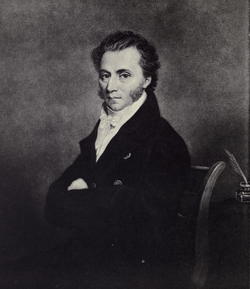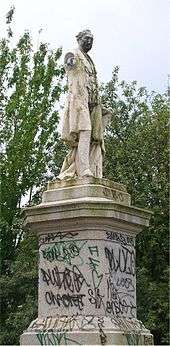Thomas Attwood (economist)
Thomas Attwood (6 October 1783 – 6 March 1856)[1] was a British banker, economist, political campaigner and Member of Parliament. He was the leading figure of the underconsumptionist Birmingham School of economists, and, as the founder of the Birmingham Political Union, the leading figure in the public campaign for the Great Reform Act of 1832.
Thomas Attwood | |
|---|---|
 | |
| Member of Parliament for Birmingham | |
| In office 1832 – 1840 | |
| Succeeded by | Joshua Scholefield and George Muntz |
| Personal details | |
| Born | 6 October 1783 Halesowen, Shropshire, England |
| Died | 6 March 1856 (aged 72) Great Malvern, Worcestershire, England |
| Spouse(s) | Elizabeth Carless (m. 1806) |
| Relations | Daniel Wakefield (son-in-law) |
| Occupation | Banker, economist, political agitator, Member of Parliament |
| Nickname(s) | King Tom |
Life and career
Thomas Attwood was born in Halesowen, then a detached part of Shropshire, and attended Halesowen Grammar School (now Earls High School) before being moved to Wolverhampton Grammar School. On 12 May 1806, Attwood married Elizabeth Carless from Lower Ravenhurst Farm, an area which is now part of the Moor Pool estate.[2] They had two sons, George de Bosco Attwood (15 March 1808) and Thomas Aurelius Attwood (4 March 1810).[2] Their daughter Angela married Daniel Wakefield with whom she emigrated to New Zealand.[3]
He founded the Birmingham Political Union in 1830. This was a political organization campaigning for cities, and large towns such as Birmingham, to be directly represented in Parliament. The Birmingham Political Union was foremost among groups lobbying the government for the passage of a Reform Bill to achieve this aim. The Days of May in 1832 brought the people's struggle for wider enfranchisement to a head, and the Great Reform Act was passed on 15 May 1832. After this success he became one of the first two Members of Parliament (MPs) for Birmingham (along with Joshua Scholefield) on 12 December 1832, a position he held until 1839.
Attwood lived at The Grove, a Georgian house in Harborne, Birmingham, between 1823 and 1846. He died in Malvern, Worcestershire in 1856.
Memorials


A grade II listed statue of Thomas Attwood stood in Larches Green, Sparkbrook, Birmingham between 1974 and 2008, but is now in store. A 1993 bronze statue sat, having left his plinth, and scattered his bronze pages, on the steps of Chamberlain Square in Birmingham until the demolition of the Central Library in 2016.
Attwood Street, a residential street in Halesowen, commemorates his achievements.
See also
References
- Behagg, Clive (2009), "Attwood, Thomas (1783–1856), politician and currency theorist", Oxford Dictionary of National Biography (Online ed.), Oxford University Press, retrieved 21 January 2012
- Moss, David J (1990). Thomas Attwood: The Biography of a Radical. McGill-Queen's University Press. p. 31. ISBN 0-7735-0708-6.
- McLintock, A. H. (ed.). "Wakefield, Daniel". An Encyclopaedia of New Zealand. Ministry for Culture and Heritage / Te Manatū Taonga. Retrieved 3 June 2018.
Bibliography
- Attwood, Thomas (1964). Frank Whitson Fetter (ed.). Selected economic writings of Thomas Attwood. London: The London School of Economics and Political Science.
- Moss, David J (1990). Thomas Attwood, the biography of a radical. Montreal: McGill Queens University Press.
External links
- www.thepeoplescharter.co.uk
- Hansard 1803–2005: contributions in Parliament by Thomas Attwood
- Biography
| Parliament of the United Kingdom | ||
|---|---|---|
| New constituency | Member of Parliament for Birmingham 1832–1840 With: Joshua Scholefield |
Succeeded by Joshua Scholefield and George Muntz |